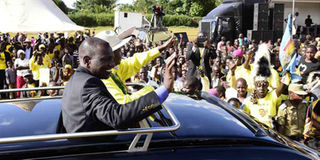Intrigues of Raila and Ruto battles in Uganda election

Kenya Deputy President William Ruto accompanies National Resistance Movement Presidential candidate Yoweri Museveni to a rally at Barawa Parish, Uganda, on December 9, 2015. Mr Ruto has been openly campaigning for the incumbent. PHOTO | MONITOR
What you need to know:
- By sucking in Kenyan protagonists, the Ugandan elections have expanded the political theatre for the two former allies-turned bitter rivals.
- In the rallies, Mr Ruto dismissed Mr Odinga’s attempt to build a coalition between Dr Besigye and Mr Mbabazi under The Democratic Alliance (TDA). He said the two were borrowing a leaf from a loser.
- Mr Museveni needs this vote to counter Mr Odinga’s Luo groups such as the Lango and the Acholi who are traditional supporters of the opposition since the days of Dr Milton Obote.
Kenya’s top politicians are battling to influence the outcome of elections in Uganda in a trend that is loosening the established tradition of non-interference in countries’ internal affairs.
Cord leader Raila Odinga supports opposition leaders Amama Mbabazi and Kizza Besigye and has been working behind the scenes in an effort to unite them against President Yoweri Museveni.
Deputy President William Ruto has been openly campaigning for the incumbent.
On Friday, a source close to Mr Odinga who is not authorised to speak on the matter said he had met the Ugandans in Nairobi twice.
‘‘The idea is to come up with a single candidate to face President Museveni,’’ he said adding that more meetings are planned.
This week, Mr Ruto accompanied Mr Museveni on the campaign trail in Kapchorwa in eastern Uganda.
The region is inhabited by the Sebei, a subgroup of Kenya’s Kalenjin people.
There have also been claims that members of the Sabaot community from the Kenyan side are crossing over to Uganda to register as voters ahead of the February 18 elections.
But on Friday, Bungoma County Commissioner Mohammed Maalim denied knowledge of the voter exports.
“All we know is that peace prevails along the border and we have never heard Kenyans registering as voters in Uganda,” said Mr Maalim.
By sucking in Kenyan protagonists, the Ugandan elections have expanded the political theatre for the two former allies-turned bitter rivals.
The campaigns also come against the backdrop of the spat over Ugandan sugar imports during which Raila and Museveni had heated exchanges.
Kenyans too were immersed in the recently concluded Tanzanian elections, in which Mr Odinga campaigned for his long-time friend John Pombe Magufuli of Chama Cha Mapinduzi.
INTRIGUING REPORTS
Taking the cue, supporters of President Kenyatta and DP Ruto rallied behind the Opposition candidate, former Prime Minister Edward Lowassa.
Mr Magufuli’s win was treated as a win for Raila and some analysts now see the Ruto campaign in Uganda as a strategy to even the score with the former PM in the fight for regional influence.
Two weeks ago, The Sunday Monitor reported that Mr Ruto had summoned National Resistance Movement primaries poll losers from Sebei sub-region to his home town of Eldoret.
It also emerged that on November 18, Mr Ruto had met the NRM flag bearers for various positions in Sebei at his offices in Nairobi.
A report on the meetings prepared by Mr Anthony Kuka Cherotich, the PS political affairs in Uganda’s State House – a copy of which Saturday Nation has seen – indicates that the agenda of the two meetings was the state of NRM in Sebei sub-region, roads and other social services.
“Leadership is about service and should not be abused. Unity among Sabaot (including Sabiny/Sebei in Uganda) is key for development of the region and supporting Museveni is very vital if Sebei is to develop,” the report quotes Mr Ruto to have told the meetings.
The Ugandans asked Mr Ruto to join Mr Museveni when he goes to campaign in Sebei between December 8 and 9.
And indeed, on the morning of December 9, a white helicopter with a Kenyan flag roared into the mountainous Kapchorwa.
The chopper had on board Mr Ruto, Trans Nzoia County senator Henry Ndiema and other politicians from the DP’s home region.
When we asked Mr Ruto why he was dabbling in Ugandan politics, Mr Museveni interjected, dismissing the question as “rumours from the media”.
“[That] my presence here may be construed that I have come to campaign for Museveni? Museveni has been campaigning in Uganda for a very long time. He has sufficient experience and knowledge. I do not think he would require the support of Kenyans to campaign for him,” Mr Ruto said.
A LOSERS TEAM
In the rallies, Mr Ruto dismissed Mr Odinga’s attempt to build a coalition between Dr Besigye and Mr Mbabazi under The Democratic Alliance (TDA). He said the two were borrowing a leaf from a loser.
On October 8, Mr Ruto was in Kampala for the National Prayer breakfast during which Mr Museveni asked him to work with the people of Sebei.
Later that evening, the Sabiny/Sebei community in Kampala hosted the Kenyan Number Two to a dinner at Silver Springs in Bugolobi.
In Uganda, analysts think Mr Museveni’s warm reception to Mr Ruto is a strategy aimed at paying Raila in the same currency – for hosting his opponents Besigye and Amama, and for opposing the sugar trade deals.
Mr Ruto’s political confidants, Energy Cabinet Secretary nominee Charles Keter and Farouk Kibet, a personal aide, held a fundraiser in aide of Riwo Secondary School in Kongasis Constituency in Uganda.
The Sabiny and the Nandi from which Mr Ruto comes, belong to the larger Kalenjin group, and it is clear Mr Museveni is keen to play this ethnic card to win over the community where Mbabazi has significant support.
Mr Museveni needs this vote to counter Mr Odinga’s Luo groups such as the Lango and the Acholi who are traditional supporters of the opposition since the days of Dr Milton Obote.






